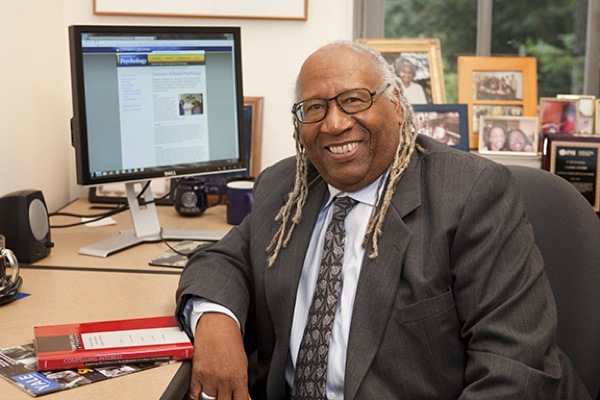
CTAL Scholars Program
Multiversity Project to investigate multicultural course outcomes
1:56 p.m., Sept. 2, 2014--A new Multiversity Project to investigate the learning outcomes from taking multicultural-designated courses is being initiated this fall at the University of Delaware as part of the Center for Teaching and Assessment of Learning (CTAL) Scholars Program.
Leading the project is James Jones, psychology professor and director of the Center for the Study of Diversity, who says he is curious to understand how and where students experience learning opportunities that help them broaden their perspectives, deepen self-understanding and inform their behavior and decision-making.
Campus Stories
From graduates, faculty
Doctoral hooding
UD adopted a multicultural course requirement more than 25 years ago because it recognized the importance of having a curriculum that enables students to reach toward a more comprehensive understanding of the world. However there was no understanding of the efficacy of these courses until 2004, when the Faculty Senate’s Undergraduate Studies Committee (USC) outlined five specific goals for the courses to address.
With the USC goals in mind, the Multiversity Project seeks to understand the impact of courses on a student’s knowledge of groups and various perspectives, one’s understanding of oneself, as well as how this knowledge and understanding influences behavior in a diverse world and engages with others.
The Multiversity Project has developed a rubric for “Diversity Learning,” which is inspired by the Global Learning Value Rubric of the Association of American Colleges and Universities (AACU). The project will use this rubric to identify specific learning experiences that help students meet its goals, as well as what general diversity competencies are produced. In time, the project aims to build a profile of high impact multicultural courses, including the various influences of course size, pedagogical strategies, and/or field of study as they relate to the acquisition of particular learning goals.
Barret Michalec, assistant professor of sociology and another CTAL Scholar, is a co-investigator, and key contributors to the project are Alexis Wiggins, CSD Undergraduate Summer Research Scholar, and Bess Davis, CSD program coordinator.
Fitting with CTAL’s mission, the project will help support and disseminate high quality learning opportunities at UD. It also will provide documentation for the Middle States Commission on Higher Education as UD prepares for its five-year accreditation process. '
In addition, Multiversity fits within a larger set of capability issues that interest Jones, who recently published the textbook, The Psychology of Diversity. He sees diversity as inclusive of a set of competencies that are consequences of learning in the formal curriculum and in co-curricular activities.
In terms of diversity competencies, Jones said, “We live in an increasingly diverse society, and have set diversity as an important part of the educational mission at UD. It becomes important then to assess ways in which multicultural courses increase self-awareness, perspective taking, cultural diversity knowledge, personal and social responsibility and global understanding. And al of these should lead to greater competence in decision making and activities. And these should be demonstrable.”
Jones said he sees this project as the first part of a larger initiative. “Understanding diversity is part of educational experience and fabric of this University; we need to be thoughtful and programmatic and explore all the ways diversity is advanced,” he said, adding that it is important to be able to record and account for the ways in which students learn these competencies.








